Benedict XVI rejected by Rome's Sapienza University students and professors
Watch video 11:44 minutes interview with a physics professor, a woman student and others at La Sapienza University why the Romans reject the Bishop of Rome.
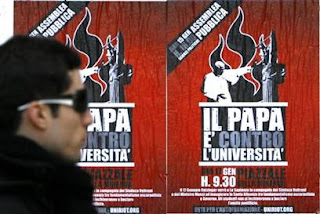
A student walks past a banner reading "The pope is against the university" at La Sapienza University in Rome on Monday
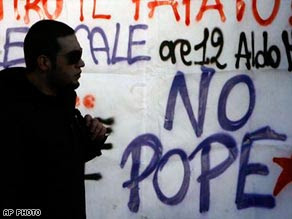
A student walks past a banner reading: "Against the Papacy" and "No Pope" at La Sapienza University.
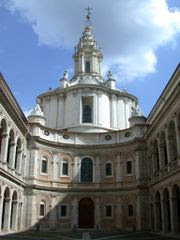
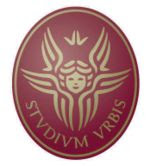
Pope Cancels University Jan. 17 Visit After Protests
Rome's own Sapienza University students and professors, including the entire physics faculty, protested Benedict XVI's visit and speech because he believes more in faith than in reason and science -- "Benedict XVI is hostile to modern science". Student groups had put up banners protesting the pope's visit on walls around the campus. Today they occupied the Rector's office in protest. Well, well, well, it's not a surprise that, now, the Opus Dei Pope who is John Paul II clone of doctrine and dogmas is being rejected by the younger generation who will not submit to papal autocracy like Galileo and the Jesuits. Benedict XVI just dismantled the (Jesuit) Vatican Observatory (on the eve of their 35th General Congregation)- because he'd rather spend the time star gazing with his GAY Private Secretary...while the Church rot in the scum of the John Paul II Pedophile Priests Army. So THANK YOU, Sapienza University students and professors, YOU have just PROVED ME RIGHT and my weblogs the John Paul II Millstone RIGHT! Halleluya! Molto Grazie ! God's Rottweiler Mille Grazie !
Students' 4 days of protest
Papal visit scuppered by scholars.
Pope Benedict XVI has cancelled a visit to a prestigious university in Rome where lecturers and students have protested against his views on Galileo.
The Pope had been set to make a speech at La Sapienza University on Thursday.
Sixty-seven academics had said the Pope condoned the 1633 trial and conviction of the astronomer Galileo for heresy.
The Vatican insists the Pope is not "anti-science" - but in light of the protests they have decided it would be better for him not to attend.
Galileo had argued that the Earth revolved around the Sun.
The Vatican says the Pope will now send his speech to La Sapienza, instead of delivering it in person.
Landmark controversy
Pope Benedict was in charge of Roman Catholic doctrine in 1990 when, as Cardinal Ratzinger, he commented on the 17th-Century Galileo trial.
In the speech, he quoted Austrian-born philosopher Paul Feyerabend as saying the Church's verdict against Galileo had been "rational and just".
Galileo's inquisitors maintained the scriptures indicated the Earth was stationary.
Galileo, a devout Catholic, was forced to renounce his findings publicly.
In 1992, Pope John Paul II expressed regret at the way Galileo had been treated.
"The error of the theologians of the time, when they maintained the centrality of the Earth, was to think that our understanding of the physical world's structure was, in some way, imposed by the literal sense of Sacred Scripture," he said.
The academics at La Sapienza signed a letter saying Pope Benedict's views on Galileo "offend and humiliate us".
They said it would be inappropriate for the Pope to open their academic year on Thursday.
"In the name of the secular nature of science we hope this incongruous event can be cancelled," said the letter addressed to the university's rector, Renato Guarini.
In a separate initiative, students at La Sapienza organised four days of protest this week. The first revolved around an anti-clerical meal of bread, pork and wine, the BBC's Christian Fraser reports from Rome.
The banner at their lunch read: "Knowledge needs neither fathers nor priests".
Vatican Radio said the protest at La Sapienza had "a censorious tone".
"It's a good thing that someone in Italy has the courage to say no to the Pope."
Stefano, Cuneo, Italy
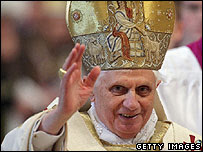
An old controversy has come back to haunt the Pope
Upload Video

Video of La Sapienza University anti-Benedict XVI protest
La Sapienza: 'UNACCEPTABLE INTOLERANCE'
From: ROMEreports TV News Agency
Benedict XVI chose not to speak at Rome’s La Sapienza University to avoid risking a pretext for unpleasant confrontations between extremist groups.
Galileo protest halts pope's visit
ROME, Italy (CNN) -- Pope Benedict XVI has canceled a planned visit to a prestigious Italian university after a protest by academics and students attacked his views on Galileo, the Vatican confirmed Tuesday.
The pope had been due to give a speech at La Sapienza university in Rome Thursday to open its academic year.
However, the visit drew criticism from academics at the university who signed a letter demanding that the trip be called off. Separately, students protested outside the university, carrying banners insisting the university is a lay institution and the pope is not welcome.
"Given the events of the past days regarding the visit of the Holy Father to La Sapienza university upon the rector's invitation, which was scheduled to take place Thursday, January 17, it was decided to postpone the event," the Vatican said in a short written statement.
Father Ciro Benedettini, a spokesman for the Vatican, confirmed to CNN the academic protests had prompted the cancellation.
In the letter, academics -- pointing to a speech the pope gave at the same university as a cardinal in 1990 -- claimed he condones the 1633 trial and conviction of the scientist Galileo for heresy.
The astronomer had argued that the Earth revolved around the Sun, in contradiction to church teachings at the time, and he was forced to renounce his findings publicly.
In comments made 15 years ago when he was still a cardinal, Pope Benedict is reported to have called the trial "reasonable and just."
During his speech, the pope -- then Cardinal Ratzinger -- quoted an Austrian philosopher Paul Feyerabend, saying, "At the time of Galileo, the church remained more loyal (or faithful) to reason than Galileo himself.
Andreas Srova, a physics professor at the university, said it would have been inappropriate for the pope to appear for the inauguration.
Srova, who signed the protest letter and is the author of a book detailing the 1633 trial, said he is "very satisfied" that the Vatican decided to cancel the trip.
"We have no objections to the pope visiting at any other time when there can be exchanges of opinion, but not at the inauguration," he said. "It was a mistake to ask him to come at this time."
CNN's Rome bureau chief Alessio Vinci said it was quite extraordinary for the pope to cancel the visit just because of the objections of the students and professors. It Is especially surprising, he said, given that this is the same pope that made a controversial visit to Turkey last year.
Pope Benedict went to the predominantly Muslim country despite strained relations between the Vatican and the Islamic world following a lecture the pope gave at a German university in which he made unflattering comments about the Islamic faith.
----------
Pope cancels visit to university after protests
Students, professors objected; Rome mayor calls it cultural defeat
MSNBC
VATICAN CITY - Pope Benedict XVI has canceled a planned visit to a Rome university following protests by professors and students, the Vatican said Tuesday.
Benedict had been scheduled to speak Thursday at La Sapienza, a public university founded by Pope Boniface VIII in 1303, as part of ceremonies inaugurating the new academic year.
But more than 60 professors signed a letter to the university rector opposing the pope's visit. Banners decrying the pope were strung from buildings and posters plastered on walls.
Protests against the pontiff, the leader of the Roman Catholic Church, are not uncommon, but "it was considered opportune to skip the event," the Vatican said in a brief statement Tuesday.
Instead, Benedict will send his speech to the university, the Vatican said. Rome's mayor and the government's minister for universities still are scheduled to speak at La Sapienza.
Rare cancellation
Such a cancellation of a scheduled papal event is extremely rare, and the few times it has happened in recent decades, the Vatican has cited security concerns. No specific reason was cited Tuesday.
Vatican Radio described the mobilization by students and professors at Europe's largest university as smacking of censorship.
The university rector, Renato Guarini, criticized the protests as "a fundamentalist attitude of great intellectual closure."
He said 63 instructors — out of a total of 4,500 — had signed the letter. He had said students would have been allowed to gather in a designated area Thursday during the pope's visit.
Rome Mayor Walter Veltroni, who was also one of the scheduled speakers, said the cancellation "represents a defeat of liberal culture and that fundamental principle which is the confrontation of ideas and respect for institutions."
Italian Premier Romano Prodi urged the pontiff to change his mind. "No voice must go silent in our country, let alone that of the pope," Prodi said in a statement.
The theme for the school ceremony is efforts to abolish the death penalty worldwide, a theme close to the Vatican's interests, although the topic of the pope's speech was not revealed.
Students react with applause
When news of the cancellation reached the campus, students in a political sciences hall broke into applause.
Guarini said he respected the pope's decision although the academic leader expressed "regret."
"The encounter with the pope could have represented an important moment of reflection for believers and nonbelievers on ethical and civil problems," such as the campaign to abolish the death penalty, the rector said.
Before the cancellation, the rector had said students would have had a designated area where they could protest during the papal visit.
The university has 145,000 students.
------------
Sapienza University of Rome
Sapienza University of Rome (Italian Sapienza Università di Roma) is the largest European university and the most ancient of Rome's three public universities. In Italian, Sapienza means "wisdom" or "knowledge".
La Sapienza was founded in 1303 by Pope Boniface VIII, as a Studium for ecclesiastical studies more under his control than the universities of Bologna and Padua.
In 1431, Pope Eugene IV introduced a new tax on wine, in order to raise funds for the university; the money was used to buy a palace that later hosted the Sant'Ivo church, "La Sapienza."
According to the Catholic Encyclopaedia, the university "remained closed during the entire pontificate of Clement VII". In 1870, La Sapienza stopped being the papal university and became the university of the capital of Italy. In 1935, the new university campus, planned by Marcello Piacentini, was completed.
In the academic year 2006/7, La Sapienza has 21 faculties to its 138,000 students and is the largest university in Western Europe. It has many locations in Rome, but is mainly situated in the Città Universitaria, near Termini Station.
---------
Pope Cancels University of Rome Visit After Protests
VATICAN CITY, JAN. 15, 2008 (Zenit.org).- Benedict XVI canceled his visit to Rome's Sapienza University amid protests from professors and students regarding the Church's role in science.
The visit was planned for Thursday, but a group of professors and students signed a letter protesting the visit by a Pope whom they claimed is "hostile to science."
Today, the protesters occupied the rector's offices in protest.
The Vatican press office reported today that "it has been considered opportune to postpone the event," which had been planned "by invitation of the major rector."
The Holy Father will nevertheless send the discourse he had prepared, the Vatican statement added.
The protesters' letter mentioned a 1990 speech at Sapienza University that then Cardinal Ratzinger gave about the Church's 17th-century condemnation of Galileo. The signatories of the protest letter mentioned that the future Pope quoted an Austrian philosopher who said the trial was "rational and just." The protesters did not mention that Cardinal Ratzinger went on to say that he was not in agreement with the philosopher.
Renato Guarini, rector of the university, said he had awaited Benedict XVI, a theologian and professor and "messenger of peace," to live "a moment of high culture" and an "interchange of ideas that would be fruitful for the entire university community."
Giorgio Israel, a Jewish mathematician and professor at the university, noted in L'Osservatore Romano that the 1990 speech actually defended Galileo.
Cardinal Ratzinger said at that time, "Faith does not grow from a resentment and refusal of rationalism, but from its basic affirmation."
Israel lamented the contradiction of those who have opposed Benedict XVI's visit, who are purportedly defending the secularism of science, but are also negating the freedom of speech. The article in L'Osservatore Romano was published before the Vatican announced today that the Pontiff would postpone the visit.
"It is surprising," the mathematician said, "that those who have chosen as a motto Voltaire's famous phrase, 'I don’t agree with what you say, but I will defend to the death your right to say it,' oppose themselves to the Pope pronouncing a discourse at the university of Rome."
(Zenit is owned, written and operated by the Legion of Christ, founded by the pedophile Fr. Marcial Maciel. Therefore, in the subtle ways of Opus Dei, they defend the Pope who is their puppet.)
Fr. Maciel passed away on February 1, 2008 -- at age 87.


0 Comments:
Post a Comment
<< Home